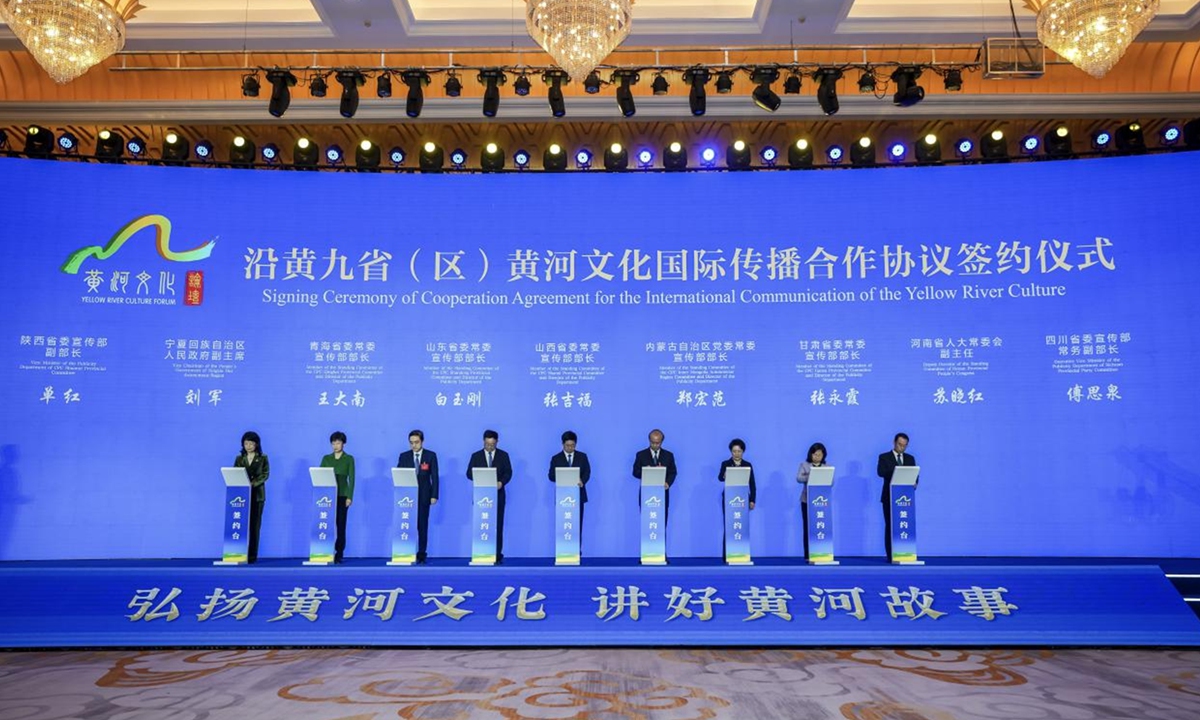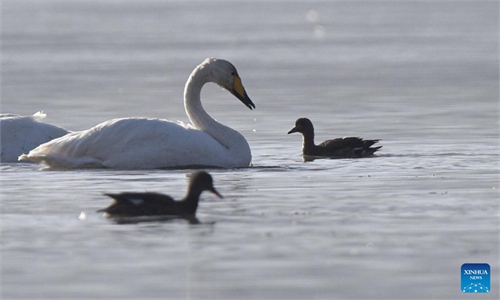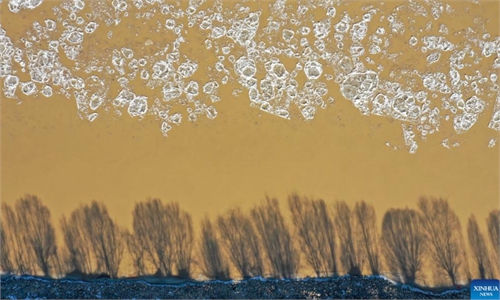
A cooperation agreement for communication among the nine provinces and regions along the river was signed at the opening ceremony of the Yellow River Culture Forum on April 19, 2023. Photo: Lin Xiaoyi/GT
A groundbreaking two-day forum focusing on promoting the profound culture of the Yellow River, China's "mother river," and exploring the contemporary development path for its protection and inheritance sparked a lively discussion and achieved fruitful results among dozens of Chinese and overseas scholars, experts, and officials in Dongying, where the Yellow River flows into the sea in East China's Shandong Province.Those in attendance at the Yellow River Culture Forum which started on Tuesday reached a consensus that Yellow River culture is an important part of the Chinese civilization, and the Yellow River basin is a vital ecological security barrier for China, stressing that the implementation of the major national strategy for the ecological protection and high-quality development of the Yellow River basin, and the in-depth exploration of the rich connotations and contemporary values of Yellow River culture need further joint efforts from all sectors in China, especially in the areas along the Yellow River.
Flowing for about 5,464 kilometers through nine provinces and autonomous regions across North China, the Yellow River is an age-old witness to the nation's history. As the cradle of the Chinese culture, the Yellow River basin has been the political, economic, and cultural center of China. It supplies water to 12 percent of China's population and irrigates 17 percent of the country's arable land.
"The destinies of humanity and water are undeniably intertwined...Throughout the 5,000 years history of the Chinese civilization, the destiny of the Chinese nation has been certainly linked with [that of] the Yellow River and it's like living waters have nurtured the land, shapng the course of China, the rich and enduring legacy, [and] rich history," Shahbaz Khan, director and representative of UNESCO's Beijing office said in a video speech to the forum.
In China, a large number of archaeological discoveries have proven that the Yellow River basin was the main area of early human activity in China, and is the root of the Chinese civilization," Wang Zhimin, chief editor of Yellow River Culture Overview, told the Global Times.
The Yellow River is one of the world's most famous rivers, and basically all the world's major civilizations have grown and developed under the nurturing of the great rivers, Wang said, noting that the cultural development of the Yellow River embodies a common rule of civilization development, which is an important reason why the Yellow River does attract the attention of the world.
Yu Yunquan, dean of the Academy of Contemporary China and World Studies of China International Communications Group, told the Global Times that Yellow River culture has witnessed and interpreted the evolution of the Chinese civilization from the Central Plains civilization through eclecticism to a pluralistic, multi-cultural development, which has nurtured the Chinese people's gene of openness and inclusiveness. "And the Yellow River culture further demonstrates the charm of the Chinese civilization in the process of opening up and engaging in exchanges with the outside world in contemporary China."
Yu also noted that the Yellow River has been an important subject of international cooperation in the field of communication. For example, in 2014, Japanese media outlet NHK and China's Ningxia TV jointly shot the documentary To the Birthplace of the Stars: A Journey to the Source of the Yellow River. The Yellow River Piano Concerto which has also become a required piece for many cross-country concerts.
At the same time, in recent years, China's remarkable ecological conservation achievements along the Yellow River also won recognition from the participants. Liu Youbin, the Ministry of Ecology and Environment spokesperson shared a set of encouraging figures at the forum: The number of bird species in the Yellow River Delta Nature Reserve has increased from 187 species when the area was established in 1992 to 371 species currently; the water conservation capacity in the upper reaches of the river has been enhanced, leading to the vegetation coverage rate of the Kubuqi Desert in North China's Inner Mongolia Autonomous Region to reach 53 percent.
"Now in China, and I think it is a wonderful idea for the world too that China transforms the industrial civilization in an ecologically friendly one," Javier García, a journalist from Spain and professor at the Renmin University of China, told the Global Times.
"And I think that is a very important Chinese answer to communicate with the world," he said.
During an inspection of the Yellow River Delta National Nature Reserve accompanying the forum on Wednesday, many foreign experts marveled that Dongying, which was once hyped by the Western media as a place of "exploited oil in the natural reserve at the mouth of the Yellow River," is now the picture of a harmonious ecological scene of green development and harmonious coexistence between humanity and nature.
At the forum, authorities in education, culture, and tourism from nine provinces and autonomous regions along the Yellow River signed a number of cooperation agreements, hoping to forge stronger synergy across the Yellow River basin, making full use of the rich cultural connotation of the Yellow River Basin, which will help them jointly write a new chapter of ecological protection and high-quality development in the Yellow River basin.



